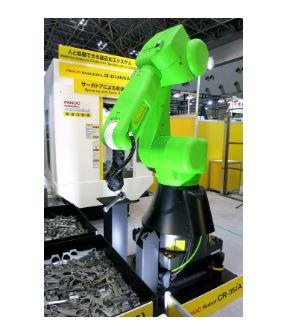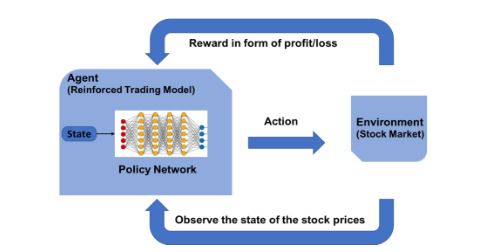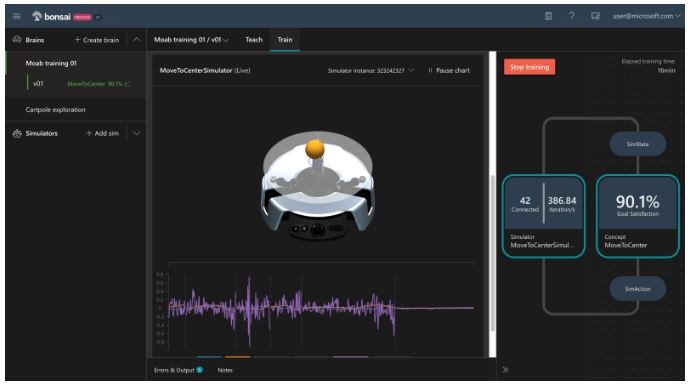Introduction
When it comes to reinforcement learning the first application which comes to your mind is AI playing games. Thanks to popularization by some really successful game playing reinforcement models this is the perception which we all have built. But if we break out from this notion we will find many practical use-cases of reinforcement learning. In this article, we will see some of the most amazing applications of reinforcement learning that you did not know exist.
Applications of Reinforcement Learning
1. Manufacturing
We already know how useful robots are in the industrial and manufacturing areas. But now these robots are made much more powerful by leveraging reinforcement learning.
Fanuc, the Japanese company, has been leading with its innovation in the field of industry-based robots. For the past few years, Fanuc has been working actively to incorporate deep reinforcement learning in their own robots.

Fanuc has looked to collaborate with other industry leaders such as Cisco, Rockwell Automation, and NVIDIA, to achieve their vision of building intelligent robots through Artificial Intelligence.
This Japanese Giant uses deep reinforcement learning for their robots in such a way that the robots train on their own for the most basic task of picking an object from one box and placing it into another box.
This process of training is repeated for different kinds of tasks and thus build such robots that can complete complex tasks as well.
2. Trading
Stock Market Trading has been one of the hottest areas where reinforcement learning can be put to good use. Algorithmic trading is an old field where stocks are traded with the help of algorithms to achieve better returns and reinforcement learning based financial systems can optimize the returns from stocks further.
Pit.ai has been a pioneer in implementing stock trading through reinforcement learning. Company’s founder Yves-Laurent Kom Samo looks to change the way reinforcement learning is used for such types of tasks, according to him, “Other Companies try to configure their model with features that aren’t present in stock for predicting results, instead one should focus to build a strategy for trade evaluation”.

[adrotate banner=”3″]
3. Online Recommendation
Online recommendations to provide personalized user experience have proven to be game-changers for many online companies. They are using the traditional methodologies of recommender systems, but all of this is not as easy as it sounds. There are several factors such as customer bias, unavailability of the amount of customer data, changes in customer liking, etc, due to which online recommendation can sometimes become ineffective.
However, recently, Reinforcement Learning is being also considered a useful tool for improving online recommendations. Reinforcement learning can take into account factors of both seller and buyer for training purposes and the results have been beyond expectations. Chinese Nanjing University came together with Alibaba Group to build a reinforcement learning algorithm for the online recommendation. This algorithm known as Robust DQN, is found to be giving impressive results in real-world environments as well.

4. Bid Optimization
During paid online advertisements, advertisers bid the displaying their Ads on websites to their target audience maximum payout. Generally, high bids get the best spot and target audience but advertisers cannot afford to bid very high to deplete their overall returns from ads. On the other hand, lower bids will keep them away from their target audience. They have to achieve a sweet spot for better ad performance and returns. This is known as bid optimization and its an area of the study itself.
Reinforcement learning can be used to run ads by optimizing the bids and the research team of Alibaba Group has developed a reinforcement learning algorithm consisting of multiple agents for bidding in advertisement campaigns. The results were surprising as the algorithm boosted the results by 240% and thus providing higher revenue with almost the same spending budget.
5. Marketing Strategies
Companies always take a big risk whenever they change the prices of their products, this kind of decision is generally taken on the basis of past sales data and customer buying patterns. But in many situations, it has been found to be a costly change for the companies.
Now with the recent popularity of reinforcement learning, researchers from New York University have come up with a unique algorithm, known as Inverse Reinforcement Learning. This algorithm helps in predicting the reaction of the customers in-advance by simulating the changes.

The algorithm can take into consideration different aspects such as user reaction, demographic location, usage pattern of users, etc to simulate the outcome. This type of simulation helps the companies in finding the best pricing before rolling it out to the public.
6. Reduction in Energy Consumption
Tech Giant Google has leveraged reinforcement learning in the most unique way. Google has numerous data centers that can heat up extremely high. To mitigate this problem, Google uses AlphaGo built by DeepMind, for figuring out the optimal method that can help in designing the cooling infrastructure.
The aim was to reduce the energy consumed by fans and ventilation. AlphaGo is providing recommendations on how efficiently energy should be put to use in the cooling of data centers. The results were quite good as the energy requirement was reduced to 40%, thus resulting in a huge reduction in costs.
7. Industrial Machine Teaching
Bonsai is a startup company that specializes in machine learning and was acquired by Microsoft in 2018. Microsoft recently announced Project Bonsai a machine learning platform for autonomous industrial control systems. They call it machine teaching where autonomous industrial machines can be trained using reinforcement learning in their simulation environment to make them intelligent enough to carry out operations. For example, the autonomous forklift can be trained to align itself with a pallet, lift the pallet, put it down, all with the help of their reinforcement learning platform.

8. Text Mining
One of the most widely used applications of NLP i.e. Text Mining is now being implemented with the help of Reinforcement Learning by leading cloud computing company Salesforce. The system is also able to generate readable text that can produce well-structured summaries of long textual content. This custom-built system has the feature of training on different kinds of text such as articles, blogs, memos, etc.

Conclusion
This article talks about the real-world applications of reinforcement learning. We look at the various applications of reinforcement learning in the real-world. Although reinforcement learning is still a small community and is not used in the majority of companies. But gradually the benefits of reinforcement learnings are becoming prominent and will surely become more mainstream in the near future.
-
I am Palash Sharma, an undergraduate student who loves to explore and garner in-depth knowledge in the fields like Artificial Intelligence and Machine Learning. I am captivated by the wonders these fields have produced with their novel implementations. With this, I have a desire to share my knowledge with others in all my capacity.
View all posts


